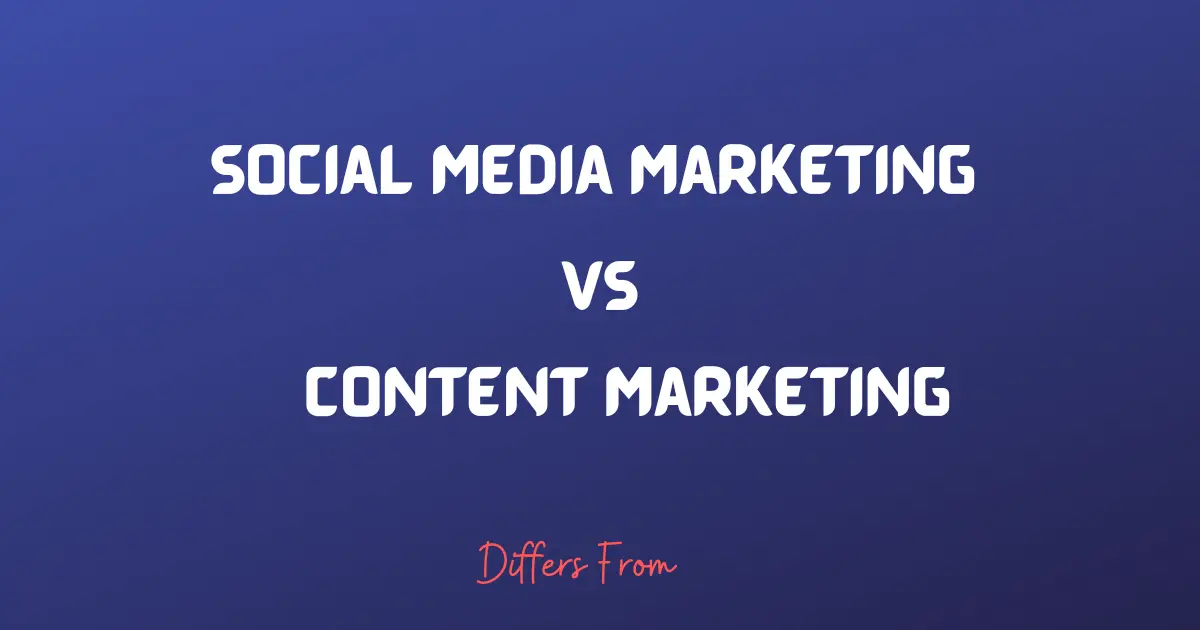Social media marketing involves promoting products or services through social media platforms, utilizing targeted advertising and engagement strategies.
Content marketing focuses on creating and distributing valuable, relevant content to attract and retain an audience, ultimately driving profitable customer action.
What is social media marketing?
Social media marketing is a form of digital marketing that harnesses the power of social media platforms to promote products, services, or brands.
It involves creating and sharing engaging content, utilizing targeted advertising, and fostering interactions with the audience.
Social media marketing aims to increase brand awareness, drive website traffic, and generate leads or sales through effective online communication and relationship-building strategies.
What is content marketing?
Content marketing is a strategic marketing approach that involves creating and distributing valuable, relevant, and consistent content to attract and engage a clearly defined target audience.
It focuses on providing information, entertainment, or educational value to the audience, rather than directly promoting products or services.
Content marketing aims to build trust, establish thought leadership, and cultivate long-term customer relationships, ultimately driving profitable customer action.
Comparison between social media marketing and Content Marketing
Both social media marketing and content marketing serve different purposes, they can complement each other. Social media marketing can amplify content reach, drive traffic to content assets, and increase engagement.
While content marketing provides the valuable content needed for social media campaigns and fosters long-term relationships with the audience.
Social Media Marketing
- Scope: Social media marketing focuses on utilizing social media platforms such as Facebook, Instagram, Twitter, LinkedIn, and others to promote products, services, or brands.
- Communication Channels: It relies heavily on the use of social media channels to engage with the audience through posts, comments, likes, shares, direct messages, and paid advertisements.
- Purpose: The primary goal of social media marketing is to increase brand visibility, drive website traffic, generate leads, foster customer engagement, and ultimately drive conversions and sales.
- Content Format: Social media marketing often involves creating shorter, concise, and visually appealing content such as posts, images, videos, infographics, and memes to capture the attention of the audience in the fast-paced social media environment.
- Real-time Engagement: It allows for real-time interactions with the audience, enabling immediate responses, feedback, and discussions.
- Targeting Capabilities: Social media platforms provide advanced targeting options to reach specific demographics, interests, behaviors, and locations, allowing for precise audience segmentation.
- Metrics: Key performance indicators (KPIs) in social media marketing include reach, impressions, engagement rate, click-through rate, conversions, and return on ad spend.
Content Marketing
- Scope: Content marketing involves creating and distributing valuable, informative, or entertaining content across various channels, including blogs, websites, podcasts, videos, e-books, newsletters, and more.
- Communication Channels: It leverages multiple channels beyond social media, aiming to engage with the audience on platforms they prefer and consume content, including search engines, email, and other websites.
- Purpose: The primary goal of content marketing is to attract and retain a target audience by offering valuable content that educates, entertains, or solves their problems.
- It builds brand authority, trust, and loyalty, leading to long-term customer relationships.
- Content Format: Content marketing allows for more in-depth and comprehensive content creation, such as long-form articles, guides, case studies, tutorials, whitepapers, and thought leadership pieces.
- Evergreen Value: Content marketing often focuses on producing evergreen content that remains relevant and valuable over time, providing ongoing benefits and driving organic traffic through search engines.
- SEO Optimization: Content marketing strategies often incorporate search engine optimization (SEO) techniques to improve visibility and rankings on search engine result pages, increasing organic reach.
- Metrics: Key metrics for content marketing include website traffic, bounce rate, time on page, organic search rankings, backlinks, social shares, conversions, and customer retention.
Difference between social media marketing and content marketing
| Social Media Marketing | Content Marketing |
| Utilizes social media platforms for the promotion. | Involves creating valuable, informative, or entertaining content. |
| Relies on social media channels for communication and engagement. | It aims to attract and retain a target audience through valuable content. |
| Focuses on increasing brand visibility and driving website traffic. | Utilizes various channels beyond social media, including blogs, websites, and podcasts. |
| Involves creating concise, visually appealing content. | Focuses on long-form, comprehensive content formats. |
| Allows for real-time interactions and immediate feedback. | Provides evergreen value and drives organic traffic through search engines. |
| Provides advanced targeting options for precise audience segmentation. | Incorporates SEO techniques to improve visibility and rankings. |
| Emphasizes paid advertising on social media platforms. | Builds brand authority, trust, and loyalty through valuable content. |
| Key metrics include reach, engagement rate, click-through rate, conversions, and ROI. | Key metrics include website traffic, time on page, organic search rankings, and conversions. |
| Utilizes social media influencers for brand promotion. | Relies on storytelling and narrative techniques to engage the audience. |
| Benefits from viral marketing potential on social media platforms. | Nurtures long-term customer relationships through consistent content delivery. |
Conclusion
Social media marketing focuses on leveraging social media platforms for promotion, targeting specific audiences, and driving engagement.
Content marketing, on the other hand, emphasizes creating valuable content across various channels to attract and retain a target audience, building brand authority and fostering long-term relationships.
FAQs
What is the primary focus of social media marketing?
Social media marketing primarily focuses on utilizing social media platforms for promoting products, services, or brands, and engaging with the audience through posts, ads, and interactions.
What is the key objective of content marketing?
The key objective of content marketing is to attract and retain a target audience by providing valuable, relevant, and informative content, building brand authority, and trust, and ultimately driving profitable customer action.
How do content formats differ between social media marketing and content marketing?
Social media marketing often involves creating shorter, visually appealing content like posts, images, and videos. Content marketing, on the other hand, focuses on producing comprehensive and in-depth content like articles, guides, and whitepapers.
What is the role of targeting in social media marketing?
Social media marketing offers advanced targeting capabilities that allow businesses to reach specific demographics, interests, behaviors, and locations, ensuring their content is seen by the right audience.
How does content marketing leverage search engine optimization (SEO)?
Content marketing incorporates SEO techniques to optimize content for search engines, aiming to improve visibility, organic rankings, and drive traffic from search engine results pages.
Which metrics are commonly used to measure success in social media marketing?
Key metrics in social media marketing include reach, impressions, engagement rate, click-through rate, conversions, and return on ad spend.
What are the long-term benefits of content marketing?
Content marketing builds brand authority, establishes thought leadership, attracts organic traffic, generates backlinks, and fosters long-term customer relationships, leading to increased customer loyalty and repeat business.

